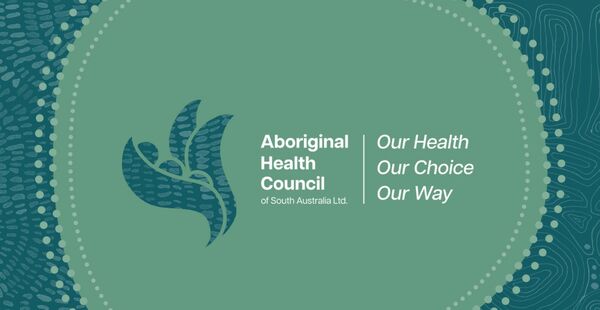Latest news
- First Nations Health Worker Traineeship (FNHWT) program launches at AHCSA
- AHCSA Sexual Health team present at Aboriginal Sexual Health Workshop, Darwin
- Aboriginal Maternal Infant Care (AMIC) course update
- 13 February 2024: National Apology Day
- Dr Lowitja O’Donoghue AC CBE DSG – 1 August 1932 - 4 February 2024
- Free Mooditj Leadership Training Course, Port Augusta
- Smoking ceremony at AHCSA
- Australia Day 2024
- AHCSA delegation meets with Federal Minister of Health & Aged Care
- SHINE SA brings Mooditj to AHCSA
- AHCSA announces management restructure
- 2023's final face-to-face class concludes at the AHCSA RTO
- AMIC Project Update: Aboriginal Maternal and Infant Care (AMIC) training back on the agenda for 2024
- AHCSA RTO: new CERT III and CERT IV classes commence
- AHCSA and members attend NACCHO annual conference
- Voice to Parliament defeated - self-care resources
- Indigenous bowel-cancer screening
- NACCHO COVID-19 Vaccination Promotion Competition 2023
- Six-week STI/BBV screening program commences at Pika Wiya
- Indigenous Voice to Parliament referendum date announced by Prime Minister Anthony Albanese
- Federal Minister of Health Hon. Mark Butler visits AHCSA
- Oodnadatta desalination plant commences operation
- Drug Alert notice: protonitazene
- NAIDOC Week 2023
- First Nations Philanthropic Funders Working Group focuses on COVID-19 preparation and recovery
- Naomi Thornthwaite and Kim Morey present at Lowitja 2023
- 2023 Lowitja Institute International Indigenous Health and Wellbeing Conference, Cairns
- Cert IV student cook-off
- National Sorry Day
- South Australian Aboriginal Health Roundtable 2023
- Celebrating new certified Aboriginal health workers
- AHCSA RTO update
- SA becomes first Australian jurisdiction to create First Nations Voice to Parliament
- AHCSA TIS team members receive awards at national conference
- AHCSA's Josh Riessen presents on Point of Care Testing for Infectious Diseases
- AHCSA delivers suicide alertness workshops in SA Far West Coast
- World Hearing Day 2023
- National Condom Day 2023
- Voluntary Assisted Dying becomes legal in South Australia
- World AIDS Day
- AHCSA's Sexual Health Team Wins People's Choice Award SH Poster!
- Media Release - AHCSA RTO
- Mparntwe Aboriginal Sexual Health NT/SA Workshop
- Dr. Annapurna Nori chats all things COVID-19 Vaccination for Kids with Gordy Rigney
- NAIDOC Week Events to Attend Across South Australia
- AHCSA Wins National Award of Recognition at 2022 NATSIEHC!
- Aboriginal Oral Health Program (AOHP)
- Yadu Health - EOI: Medical Receptionist
- World No Tobacco Day 2022 with AHCSA's Puyu Blasters
- AHCSA gives Yadu Aboriginal Health Service a Titan!
- Aboriginal Heath and Reconciliation Week With Renee Colbung
- Meet AHCSA's Quality Systems Improvement Coordinator - Venni!
- Strength and Power of Aboriginal Community Controlled Health Services in South Australia
- Is it time for an STI checkup?
- Urgent Mental Health Care Center offers an alternative to mental health support
- IWD 2022 - Celebrating AHCSA's Female Aboriginal Leaders
- AHCSA History Project
- 15 things NOT to do when using a RAT
- Fight the Bite and Mosquito Control
- The Aboriginal Flag has been freed!
- Aboriginal and Torres Strait Islander HIV Awareness Week
- South Australia's COVID-Ready Plan
- 2019/2020 Annual Report


25 January 2024
Tomorrow, Australia Day, commemorates the 1788 arrival of the First Fleet at Sydney Cove. However, for many Aboriginal and Torres Strait Islander peoples, it marks the beginning of systematic colonisation, dispossession, and infliction of suffering that continue to this day.
From an Aboriginal perspective, Australia Day represents:
- The start of devastating land displacement and violence: colonisation, frontier conflict, massacres, and forced removal from ancestral lands.
- Loss of sovereignty: Britain's claiming of Australia marked the start of Aboriginal and Torres Strait Islander peoples losing their political autonomy and ability to exercise self-determination.
- Destruction of culture and identity: colonisers banned native languages and cultural practices; children were removed from their families in the Stolen Generations.
- Entrenched racism and inequality: from the very beginnings of colonisation, institutional racism burdened Aboriginal people with discrimination, segregation, and marginalisation.
For First Nations people, Australia Day as "holiday" represents historical wounds, not nationhood. Understanding this perspective is vital to reconciliation.
The trauma experienced by Aboriginal and Torres Strait Islander people is profound. Mob, if you or those around you are experiencing mental distress this long weekend, support is available: click here for First Nations mental health resources.


 Back to all news items
Back to all news items